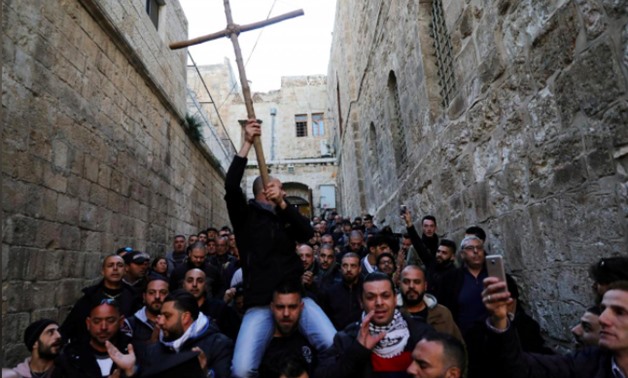
Worshippers shout slogans during a protest near the closed entrance to the Church of the Holy Speluchre in Jerusalem’s Old City, February 27, 2018 – REUTERS/Ammar Awad
CAIRO – 7 March 2018: Having faced a situation recently where the Israeli government intended to implement a tax system on its holy grounds, the Church of Holy Sepulchre is one of a kind.
Quite literally one of a kind; the church is known for being the site of Jesus Christ’s crucifixion and burial, and has since been a favorite for tourists and travelers. As such, the church does not belong to one branch or the other of Christianity; the church is the only one that pertains to all those following a religion based on Christ’s teachings.
An institution with such universality can easily garner a huge followership; one even that would be difficult to parallel. The Church of Holy Sepulchre is powerful in many ways. Firstly, its historical importance ensures that it is not solely important for Christians, it also holds a special place for non-religionists in general because it is worth preserving. It is a touristic site, one that collects large sums of money as well, especially during the Easter festivities.
Its power would be near impossible to rival; the Israeli government came to know that firsthand.
 A worshipper places his head on an altar in the Church of the Holy Sepulchre in Jerusalem’s Old City, February 27, 2018 – REUTERS/Ammar Awad
A worshipper places his head on an altar in the Church of the Holy Sepulchre in Jerusalem’s Old City, February 27, 2018 – REUTERS/Ammar Awad
The Israeli government soon enough caved after the Church shut down in protest for three days. Three days, during its prime season, were enough to force the Israeli government to understand that their strategy would never hold up. Three days were enough to cause them to give up. The Church did not carry out any attacks, counter strikes, or violence. It didn’t need to. Its status was enough.
“The rare decision on Sunday by church leaders to close the ancient holy site, a favorite among tourists and pilgrims, with the busy Easter holiday approaching put extra pressure on Israel to re-evaluate and suspend the moves,” Reuters reported on February 28.
Since the Middle Ages, churches have always played a huge role in the politics of the states they were in. They’ve always had the power to sway people to support or oppose the regime in place. But what makes the Church of Holy Speluchre stronger than any other church institution, is that it has a hold on populace beyond its borders. Existing in an already ripe situation, the Palestinian-Israeli issue, the church might look as though it isn’t doing much in terms of influence; but just like people are always fighting for the Aqsa Mosque, so they would for the Church of Holy Speluchre if they had to.
One American tourist who was in Jerusalem at the time the church was closed had said that she was hoping to visit it.
“It’s one of the holiest sites for our religion and we prayed very hard these last three days that things would change and it would be open for us to be able to go in,” said Laurie to Reuters.
In a dialogue with Egypt Today, Adeeb Joudeh, holder of the keys to the Church of Holy Sepulchre, had called on all Arabs to visit Jerusalem; asserting that refraining from visiting the Christian and Muslim hallmarks in Jerusalem would only aid Israel in evacuating the area from all Arabs.
Joudeh, who’s a descendant from Al-Husseini’s line, told Egypt Today that his family have been the holders of the church’s keys for many centuries. He said that they have had the keys since 1187 when Salah al-Din al-Ayoubi freed Jerusalem from the Crusaders. Al-Ayoubi had stated that as a gesture of affection and good-faith between Christians and Muslims, they decided to let a Muslim family hold the keys to the Church of Holy Sepulchre. Joudeh’s family have been the church’s guardians since. “We have had the keys to the church for 850 years; we care for it and defend it with our blood,” Joudeh proclaimed.
 Worshippers hold candles during a visit to the Church of the Holy Sepulchre, in Jerusalem’s Old City, February 27, 2018 – REUTERS/Ammar Awad
Worshippers hold candles during a visit to the Church of the Holy Sepulchre, in Jerusalem’s Old City, February 27, 2018 – REUTERS/Ammar Awad
A very common narrative for Israel all these years has been to drive rifts between the Christians and Muslims of Jerusalem to which Joudeh replied: “If there had been divisions between Muslims and Christians, I, the Muslim, wouldn’t be holding the keys to the Church of Holy Sepulchre. When Israel provokes the Muslims, the Christians stand by their side, and when Israel imposed taxes on the Church, the Muslims stood by their side.”
It seems that the Church of Holy Sepulchre’s influence does not only apply to its denomination, but applies as well to the people who live near it, who understand its values, and who would never allow harm to come to it, whether or not they believe in what it stands for.
That’s more power than the most states manage to garner.
This series aims to examine the influence of churches specifically within the states they are established in. The first episode of this series examined the influence that the Coptic Orthodox Church exercises on Egypt.
For the first episode of this series, press .



Comments
Leave a Comment